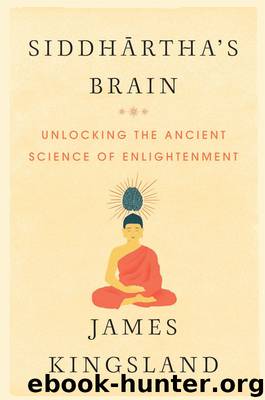Siddhartha's Brain: Unlocking the Ancient Science of Enlightenment by James Kingsland

Author:James Kingsland [Kingsland, James]
Language: eng
Format: epub, mobi, azw
ISBN: 9780062403865
Publisher: HarperCollins
Published: 2016-04-25T22:00:00+00:00
Guided Meditation: The Warm Glow
Many years ago, when I was a regular churchgoer, I would sometimes be asked to lead the congregation in prayers of intercession. As I prepared what I was going to say on the morning of the service, it was always a huge challenge to avoid making these requests for divine intervention sound like a shopping list. I would usually end up asking God to take care of the queen, the government, the sick, the disadvantaged, the downtrodden, to sort out peace in the Middle East and visit the households on a particular local street whose turn it was for special attention. In the end, what made this exercise impossible for me was that I was beginning to doubt the power of prayer to change anything. My days as a Christian were numbered.
I was wrong about the power of prayer. Prayers of intercession and compassion meditation have a lot in common, as you will see shortly, and certainly the latter has been found by scientific research to improve the meditator’s mood, reduce stress, and make them less angry, kinder, more generous, more altruistic people.50, 51 Unlike Christians, Buddhists don’t expect to change other people’s lives as a direct result of their meditations, but it seems that simply repeating inwardly the heartfelt desire that one’s fellow humans be happy and free from suffering has a powerful effect on the person expressing such wishes.
It’s worth remembering that nonjudgmental mindfulness is impossible unless one is prepared to show compassion toward both oneself and others. For Buddhists, feelings of compassion and kindness are also an expression of their conviction that all living beings are interconnected, in contrast to the more intuitive belief that each of us is a distinct Self, an island separated by deep water from everyone else’s island.
The exercise below combines traditional loving-kindness and compassion meditations, and like all the others in this book should be treated as a framework for practice rather than a rigid set of instructions. During this meditation, you start by extending feelings of compassion and kindness toward a loved one, then progressively expand these to encompass yourself; a comparative stranger; someone with whom you have a difficult relationship; and finally the entire human race.
First calm the mind by focusing on your breathing for a few minutes (see “Guided Meditation: Only the Breath”). When you’re ready, wish someone particularly close to you well by silently reciting these words:
All desire health and happiness.
May you be free from mental suffering;
May you be free from physical suffering;
May you experience joy and ease.
Envisage this sentiment of wishing your loved one well as the unconditional love of a mother comforting her child. Nurture this warm, heartfelt sensation almost as if it were a glowing ember in the center of your chest. Breathe air into this part of your body and out again, sustaining and feeding the ember, this generous internal source of warmth and compassion.
Recall a time when he or she has suffered, and as you repeat the words silently,
Download
Siddhartha's Brain: Unlocking the Ancient Science of Enlightenment by James Kingsland.mobi
Siddhartha's Brain: Unlocking the Ancient Science of Enlightenment by James Kingsland.epub
Siddhartha's Brain: Unlocking the Ancient Science of Enlightenment by James Kingsland.azw
This site does not store any files on its server. We only index and link to content provided by other sites. Please contact the content providers to delete copyright contents if any and email us, we'll remove relevant links or contents immediately.
| Anatomy | Animals |
| Bacteriology | Biochemistry |
| Bioelectricity | Bioinformatics |
| Biology | Biophysics |
| Biotechnology | Botany |
| Ecology | Genetics |
| Paleontology | Plants |
| Taxonomic Classification | Zoology |
Sapiens: A Brief History of Humankind by Yuval Noah Harari(14392)
The Tidewater Tales by John Barth(12660)
Mastermind: How to Think Like Sherlock Holmes by Maria Konnikova(7350)
The Thirst by Nesbo Jo(6945)
Do No Harm Stories of Life, Death and Brain Surgery by Henry Marsh(6942)
Why We Sleep: Unlocking the Power of Sleep and Dreams by Matthew Walker(6726)
Life 3.0: Being Human in the Age of Artificial Intelligence by Tegmark Max(5558)
Sapiens by Yuval Noah Harari(5374)
The Body: A Guide for Occupants by Bill Bryson(5099)
The Longevity Diet by Valter Longo(5066)
The Rules Do Not Apply by Ariel Levy(4970)
The Immortal Life of Henrietta Lacks by Rebecca Skloot(4589)
Animal Frequency by Melissa Alvarez(4474)
Why We Sleep by Matthew Walker(4447)
The Hacking of the American Mind by Robert H. Lustig(4385)
Yoga Anatomy by Kaminoff Leslie(4364)
All Creatures Great and Small by James Herriot(4324)
Double Down (Diary of a Wimpy Kid Book 11) by Jeff Kinney(4275)
Embedded Programming with Modern C++ Cookbook by Igor Viarheichyk(4182)
